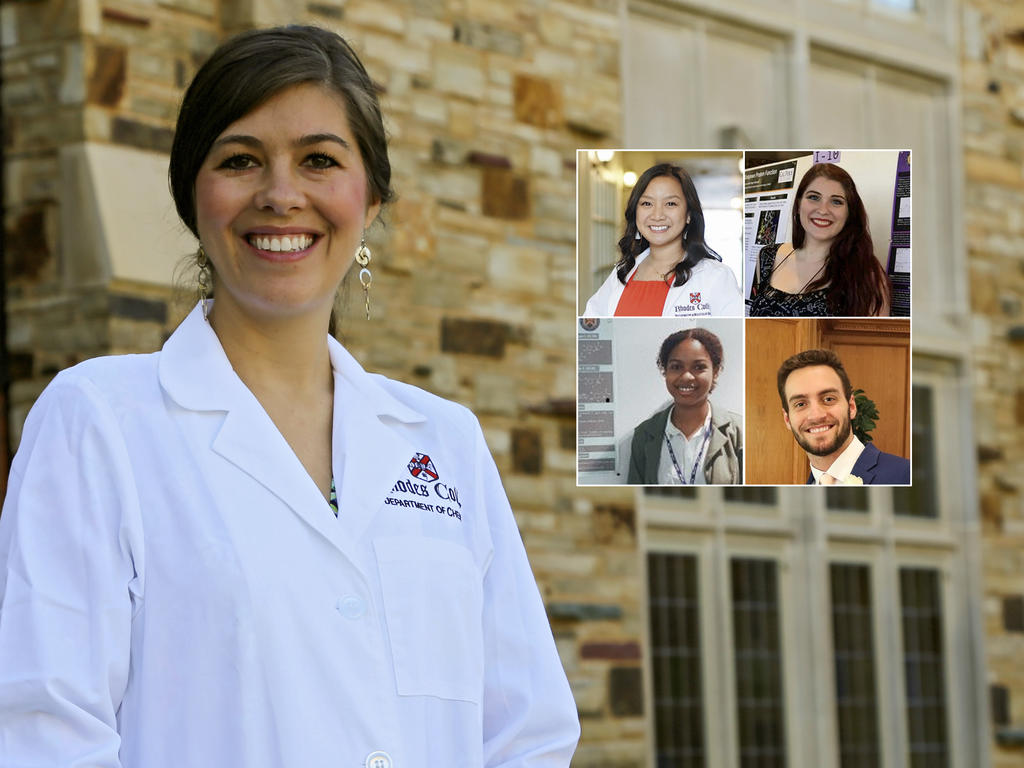Rhodes College faculty have a strong investment in training future scientists, according to Dr. Larryn Peterson, associate professor of chemistry. With a National Science Foundation (NSF) grant she received in 2017, Peterson and her team of students have been working to broaden the understanding of the complex relationship between the structure and function of a family of enzymes called dioxygenases, including L-DOPA dioxygenase. A better understanding of L-DOPA dioxygenase could provide insight into potential bioremediation uses and lead to the production of antibacterial or antitumor natural products.
Discovery. Mentoring. Critical thinking. Research output. It has been a win-win for Peterson’s team, who are also synthesizing a toolkit of novel molecules that may have applications for treating neurodegenerative diseases such as Alzheimer’s and Parkinson’s. The team even has been approached by a scientist from Brazil about sharing results and collaborating on new work. Peterson won the NSF grant with Muhlenberg College researcher Dr. Keri Colabroy, and there are plans for a Rhodes student to work in Colabroy’s lab. Peterson’s students also are benefitting in other ways.
“Professor Peterson’s lab provided me with the opportunities to present at three different conferences,” says Erykah Starr ’20. “I would not have ended up in grad school pursuing a Ph.D. in medicinal chemistry had it not been for joining Professor Peterson’s lab.”
Alexa Alana ’20 credits her undergraduate research experience as a pathway to her selection to participate in the Yale Interdisciplinary Center for Bioethics in the summer of 2020. She currently is pursuing a post-baccalaureate certificate in health equity at Rhodes.
“During my time in Dr. Peterson’s lab, I gained a more profound commitment to intellectual curiosity and grit, especially within the field of biomedicine,” says Alana. “She and my fellow lab members challenged me to think critically and to always ask questions, serving as major guiding forces in my development as a scientist and future physician.”
Rhodes senior and future chemist Ryan Marasco adds, “The research I have done under Dr. Peterson’s guidance has helped me decide on the career path that I plan to pursue. It has prepared me with experiences that will help me excel in graduate school. It has also allowed me to see what it is like to collaborate with other students on one project.”
Skyler Cochrane ’18 is pursuing a Ph.D. in chemistry at Duke University with an emphasis on the development of antibiotics against the outer membrane of Gram-negative bacteria. She published two first-coauthor papers in 2020 and has three publications in the pipeline for 2021.
“Most recently, I have begun working on a new line of research derived from my main thesis, and it’s the critical thinking skills I built at Rhodes and with Dr. Peterson that truly enabled me to explore this project,” says Cochrane. “Dr. Peterson was such a kind, intelligent, and patient mentor, and she has inspired me in more ways than I count. She truly made me believe that I had what it takes to be a professional chemist. She has served as a role model for countless students at Rhodes.”
Peterson recently received a fellowship to mentor students from the Martin-Kragh Faculty Development Fund for Biology and Chemistry established in 2006 by former Rhodes College trustee J. Stephen Martin and his late wife, Nancy Kragh Martin, parents of Stuart ’08.
Peterson’s funding from the NSF grant ends this summer, and she is preparing to submit a manuscript about her team’s work. Her students will present their recent results at the virtual American Chemical Society conference this spring.
